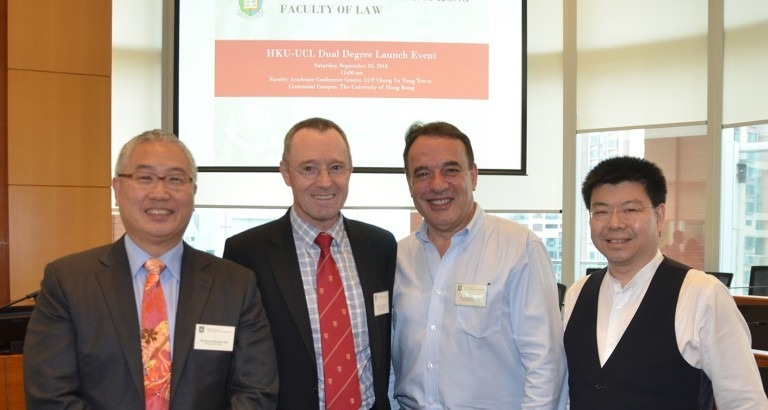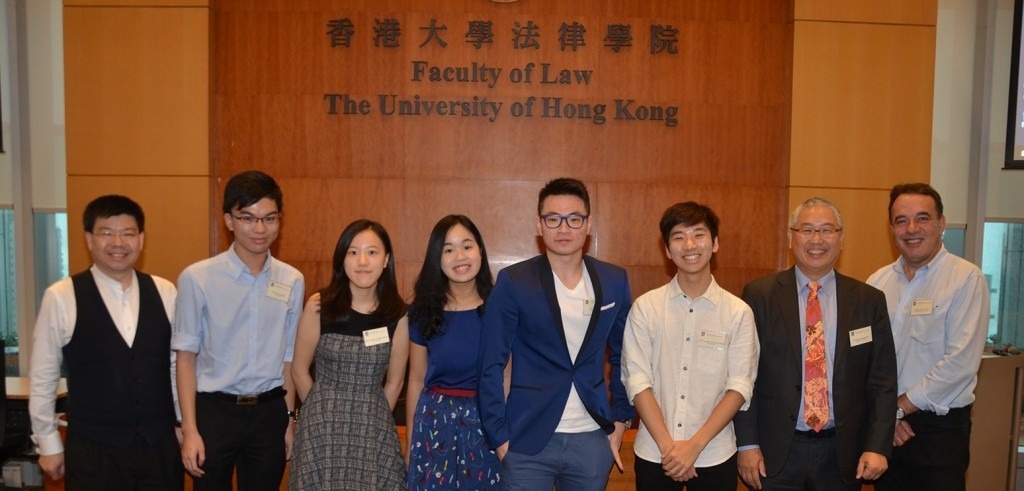PRESS RELEASES | DEC 14, 2016
HKU and UCL launch Dual Degree Programme in Law
 Officiating Guests (from left) Professor Michael Hor, Professor Ian Holliday, Professor John Lowry and Mr Andrew Ng.
Officiating Guests (from left) Professor Michael Hor, Professor Ian Holliday, Professor John Lowry and Mr Andrew Ng.
The Faculty of Law at The University of Hong Kong (HKU) and the Faculty of Laws at University College London (UCL) jointly announced a new Dual Degree Programme in Law, (“HKU-UCL Law Programme”). The Launch Event marked a strategic collaboration between two leading law schools. The HKU-UCL Dual Degree Programme in Law is aimed at students who wish to study in two of the world’s most important global financial centers, London and Hong Kong. The Event was held in the HKU campus on September 10, 2016.
Interested teachers, students and their parents from Hong Kong local and international secondary schools joined the Faculty in congratulating five students from the first cohort of HKU-UCL Law Programme.
Professor Ian Holliday, Vice-President and Pro-Vice-Chancellor (Teaching and Learning) of our University gave the welcoming remarks. He stated that the Programme was a unique and innovative professional Programme through which students would graduate with a Bachelor of Laws from HKU and a Bachelor of Laws from UCL after four years. The Programme responds to the increasingly global nature of the legal profession, which requires a new generation of lawyers with an international perspective.
He encouraged the students, as pioneers of the HKU-UCL Law Programme, saying that the Programme is attracting high calibre students. Through the Programme, students would experience the development of the common law in England, as well as trace its development in Asia. Students would gain knowledge and insights into the legal systems in England and Hong Kong .
Professor Michael Hor, Dean of Law thanked Professor Dame Hazel Genn, Dean of Laws at UCL and Professor Johannes Chan, former Dean of Law at HKU, for instituting the Programme. He stated that it is also a long term, ongoing collaboration between HKU and UCL Law Faculties. The HKU-UCL Programme constitutes an unparalleled pedagogical collaboration between two top law schools in the world (UCL Law Faculty ranks 14th and HKU ranks 17th in the latest QS rankings).
Professor John Lowry, Emeritus Professor of Law of UCL, welcomed the first cohort from HKU to the HKU-UCL Law Programme. He gave a glimpse of teaching and learning at UCL, and noted that small group teaching was one of its core elements. Students valued highly the simulation and challenges arising from class discussion. UCL has very close connections to the legal profession. It started local but has evolved into a global university.
Mr Andrew Ng, Chair of the UCL Hong Kong Club, shared with participants his experience as a student at UCL and his work as a lawyer in Hong Kong. He graduated from UCL Laws in 1985 and has over 27 years experience as a litigation lawyer in U.S., European and local law firms both in London and Hong Kong. Mr Ng talked enthusiastically about student life at UCL and his presentation was accompanied by beautiful campus pictures. He noted that Hong Kong students perform well academically and have also learnt to give back to the student community.
Dr Marco Wan, Associate Dean (International Affairs) of Law, HKU gave an introduction to the Programme to the students and parents.
He highlighted the novel aspects of the HKU-UCL Law Programme. It allows students to obtain two Bachelors of Law degrees in four years. It provides an opportunity to study the common law at its origin and gives students a solid underpinning in two jurisdictions. It develops students’ comparative insight into the interaction between the common law and civil law as it is practised in Mainland China.
The Programme also gives student a first taste of applying legal knowledge to actual cases through experiential learning at the Centre for Access to Justice at UCL. The Centre has particular strengths in education law, social welfare law and employment law. In addition, students will have an opportunity for vocational internship.
Students will spend their first two years at UCL Laws and their final two years at HKU Law. During their time at UCL, they will take most common law core subjects. When they are at HKU, they will deepen their knowledge by taking more specialised advanced-level courses.
Interested students who plan to apply via HKU can submit their application through JUPAS or non-JUPAS with an additional online application, details of which will be released on the website of the HKU Faculty of Law. Invitation for applications for 2017 admissions will open soon. For JUPAS applications, students should list HKU LLB (code: JS6406) as one of their Band A choices; for non-JUPAS applications, students should put HKU LLB as their first choice (code: 6406). There is no separate JUPAS or non-JUPAS code for the HKU-UCL Dual Degree Programme in Law. The maximum annual intake to the Programme is ten students, with a maximum of five students admitted by UCL and HKU respectively.
After a very interesting and interactive question and answer session, the five students admitted to the Programme by HKU Law were introduced.
 The first batch of HKU-UCL students attends the event with blessings from the participants for their new paths in their pursuance of legal knowledge. (From left) Mr Andrew Ng, Curtis Pak, Lillian Wong, Emily Ha, Chi Yan Ho, Clement Cheung, Professor Michael Hor and Professor John Lowry.
The first batch of HKU-UCL students attends the event with blessings from the participants for their new paths in their pursuance of legal knowledge. (From left) Mr Andrew Ng, Curtis Pak, Lillian Wong, Emily Ha, Chi Yan Ho, Clement Cheung, Professor Michael Hor and Professor John Lowry.
Lillian Wong said she has been hesitant to apply as she knew it was a highly competitive Programme. She took the challenge nonetheless for she was certain it would be a unique and rewarding experience.
Clement Cheung saw it as a dream-come-true for he had struggled to decide whether to study law in Hong Kong or the UK. He thought the Programme offered the best of both worlds and allowed exposure to both legal systems as well as engagement with different regional perspectives. He looked forward to studying at both HKU and UCL, and to becoming a global citizen.
Chi Yan Ho regarded an understanding of both local and foreign legal systems as a key to limitless opportunities professionally, especially in an increasingly globalized world occupied by multi-national corporations, with transnational dealings.
Curtis Pak was thrilled with the introduction of the Programme and had high expectations of his studies, especially in his placement and courses related to the European Union.
Emily Ha felt blessed by the prospect of the journey ahead and the experience of living in two global cities in East and West. She was also optimistic about gaining a wider scope of knowledge and greater insight into the law and its practice.
Back to News